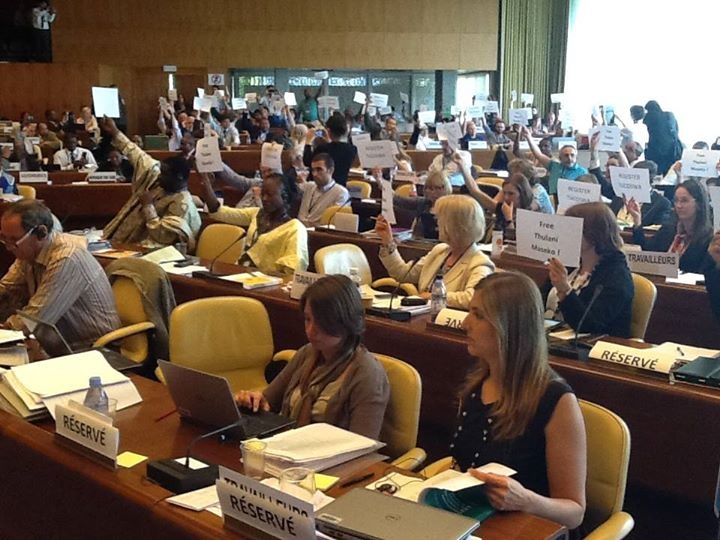16 June, 2014As Swaziland’s labour rights came under scrutiny at the International Labour Conference in Geneva, outraged worker representatives held up printed demands for the release of a jailed labour lawyer and the registration of Swazi Labour Federations.
Such protest action by all the worker representatives is unheard of in case hearings at the International Labour Conference (ILC), which is the highest decision-making body of the International Labour Organization (ILO). As a signatory to ILO Convention 87 on Freedom of Association and Protection of the Right to Organize, Swaziland was on the list of cases being examined by the ILO’s Committee on the Applications of Standards (CAS). For the past decade the Swazi government has flouted trade union and human rights and evaded interventions by the ILO on the application of Convention 87.
At the tripartite plenary discussion on 6 June 2014, the Swaziland government refused to acknowledge the lack of progress on registration of two labour federations, the Trade Union Congress of Swaziland (TUCOSWA) and the Amalgamated Trade Unions of Swaziland (ATUSWA). The government also denied violations of organizing rights and the harassment of trade union leaders.
Trade union struggles in Swaziland, where IndustriALL Global Union has three affiliates, are linked to those for political democracy. The small southern African country is governed by a monarch that instituted a state of emergency in 1973 and is still in place 41 years later. The abuse of power extends to the police and judiciary, where arrests and trials are used to deal with dissent. Most recently, Thulani Maseko, a well-respected human rights and trade union lawyer, and Nation magazine editor, Bheki Makhubu, were jailed and are being tried for contempt of court for publishing articles raising issue with the judiciary.
With clear cases of repression in Swaziland and blatant violations of trade union and human rights, efforts by the Swazi government to downplay violations during the ILC Committee hearing and claim that sufficient progress had been made sounded absurd. Predictably, a number of African government representatives at the hearing gave their support to the Swazi government and stated, in what appeared to be well-rehearsed lines, that the government had sufficiently demonstrated its full commitment to making the necessary amendments and should be given more time to put legislative measures in place.
The government member of the United States however stated that the failure to address the violations of Convention 87 in Swaziland was a “matter of grave concern”, especially as the country enjoys preferential trade with the US under the US African Growth and Opportunity Act. This was also pressed by the worker member of the US, Ms. Fisher who said that that the May 2014 deadline to amend legislation in Swaziland for continued eligibility for trade benefits had not been respected. The worker member of the UK said that trade agreements with the EU also required that international commitments, including freedom of association, freedom of assembly and free speech, were met and that in recent months the number of arrests of those criticizing the regime had actually increased.
In a rare moment of support at the ILC, several Employer delegates joined the Swaziland employer members to call for urgent compliance with C87 and the immediate registration of TUCOSWA. Employer associations are also affected by government’s decision that there is insufficient legislation in place to register federations.
(Swaziland worker members made very clear the ongoing systematic attacks on workers’ rights and the suppression of trade union activities. These include the repressive tactics of the government against union leaders and those that support the unions, like Maseko, that risk arrest, criminal records and prison in their struggle for rights.)
Three countries, Algeria, Cambodia and Swaziland were on the list of the CAS for discussion on C87. Unfortunately the Committee could not come to Conclusions on 19 cases, including these three, because the Employers group once more refused to recognise that the right to strike forms part of Convention 87.
This impasse means that no firm stand has been taken on Swaziland at the ILC this year, however the draft conclusions indicate all parties are tiring of being strung along by promises for reform by the Swaziland government that remain unfulfilled.


